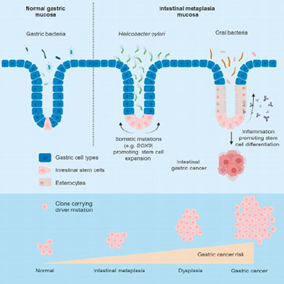Identification of genetic mutations involved in the progression from intestinal metaplasia to gastric cancer
- Intestinal metaplasia, presence of 26 cancer-causing genes... The abundance of SOX9 mutations that regulate stem cell behaviour
- As intestinal metaplasia progresses into gastric cancer, the number of cancer-causing gene mutations increases and the clone size expands.
- Prediction model based on genetic characteristics and clinical information, with high accuracy in screening high-risk groups for gastric cancer among patients with intestinal metaplasia


[Representative image] Identification of genetic mutations involved in the progression of intestinal metaplasia and gastric cancer.

[Picture] Prof Chung Hyunsoo from SNUH Department of Gastroenterology
A genetic mutation involved in the progression of ‘intestinal metaplasia’, a major risk factor for gastric cancer, has been identified. The findings of the largest-ever gene analysis study on intestinal metaplasia, carried out by a collaborative research team in Singapore and Korea, were published in the international scientific journal "Cancer Cell" (IF: 50.3). It is expected that combining the genetic characteristics of intestinal metaplasia and the patient's individual clinical information will be able to accurately predict high-risk groups for gastric cancer progression.
On Nov 30th, a multi-institutional joint research team, Seoul National University Hospital (Professor Chung Hyunsoo), National University Hospital of Singapore (Professor Jimmy So, Khay Guan Yeoh), Duke-Singapore National University Medical School (Professor Patrick Tan), announced that they had genetically analyzed 1,256 stomach tissue samples to identify the characteristics of intestinal metaplasia cells that progress to gastric cancer, and based on this, presented a model for screening high-risk groups for gastric cancer progression.
Stomach cancer is a cancer that ranks 5th in incidence and 4th in mortality worldwide. In particular, patients with ‘intestinal metaplasia’, in which gastric mucosal tissue is destroyed and transformed into an intestinal mucosa due to a continuous inflammatory response, have a six-fold increased risk of gastric cancer.
However, the mechanism of occurrence and progression of intestinal metaplasia has not been known until now. Therefore, when diagnosed with intestinal metaplasia, it is difficult to predict when and how seriously gastric cancer will develop, so both patients and medical staff have no choice but to feel anxious about a time bomb.
The joint research team conducted genome profiling based on stomach tissue samples from patients with intestinal metaplasia to molecularly analyze the process by which intestinal metaplasia progresses into gastric cancer. As a result, 26 cancer-causing genes (driver genes) related to the development and progression of intestinal metaplasia were identified.
In particular, mutations in the tumour-related gene TP53 were relatively rare, suggesting they occur in the later stage of gastric cancer formation. In contrast, mutations in the stem cell behaviour regulation gene ‘SOX9’ were abundantly observed in intestinal metaplasia tissue.
SOX9 mutations can promote expansion of intestinal stem cell clones(cell populations). In fact, as intestinal metaplasia progresses into gastric cancer, the number of cancer-causing gene mutations gradually increases and the clone size increases.
On the other hand, as a result of single-cell sequencing analysis, some stem cell lineage clones in intestinal metaplasia intestinal tissue appeared similar to early gastric cancer cells. The research team explains that this result showing the origin of gastric cancer cells means that intestinal metaplasia cells can easily change by interaction with the surrounding microorganisms and microenvironment.
Additionally, the research team discovered a specific intestinal metaplasia subtype. Although it was found in the main part of the stomach, its shape was similar to the gastric antrum (the lower part of the stomach adjacent to the intestines), and it contained ‘oral microorganisms’ that are not normally seen in a healthy stomach. In addition, abnormal characteristics that distinguish it from other intestinal metaplasia were observed, such as signs of chronic inflammation and ARIDIA gene mutations that inhibit tumor growth.
Furthermore, in order to early identify high-risk groups for gastric cancer progression among patients with intestinal metaplasia, the research team developed a gastric cancer progression prediction model that combines the genetic characteristics (number of mutations, clone size, etc.) confirmed through genome profiling and the patient's clinical variables (age, smoking history, pepsinogen index, etc.).
The model combining genetic characteristics and clinical variables was able to identify risk groups more accurately than the model using only clinical variables. The sensitivity and specificity of the model combining genetic and clinical characteristics were 88.2% and 87.6%, respectively. This had significantly higher accuracy than the model using only clinical characteristics (70.6% and 68.3%, respectively).

[Figure] Receiver Operating Characteristic (ROC) curve predicting intestinal metaplasia progression risk from genomic and clinical features
ROC curve showing accuracy of prediction based on clinical factors only (grey) or clinical and genomic factors (blue) – the blue line shows higher accuracy.
Additionally, these results presented many opportunities to improve patient treatment outcomes, such as surveillance of the highest risk groups and the possibility of cloning control with anti-inflammatory and antibacterial treatment before intestinal metaplasia progresses to cancer.
Professor Chung Hyunsoo of the Department of Gastroenterology at Seoul National University Hospital said, “The results of this study showed that genetic profiling technology can relatively accurately stratify the risk of intestinal metaplasia patients.”. “Based on these results, among patients with intestinal metaplasia, there is a high risk of developing gastric cancer.” “By distinguishing between high-risk and low-risk groups, we will be able to establish different testing and treatment strategies for each,” he said.